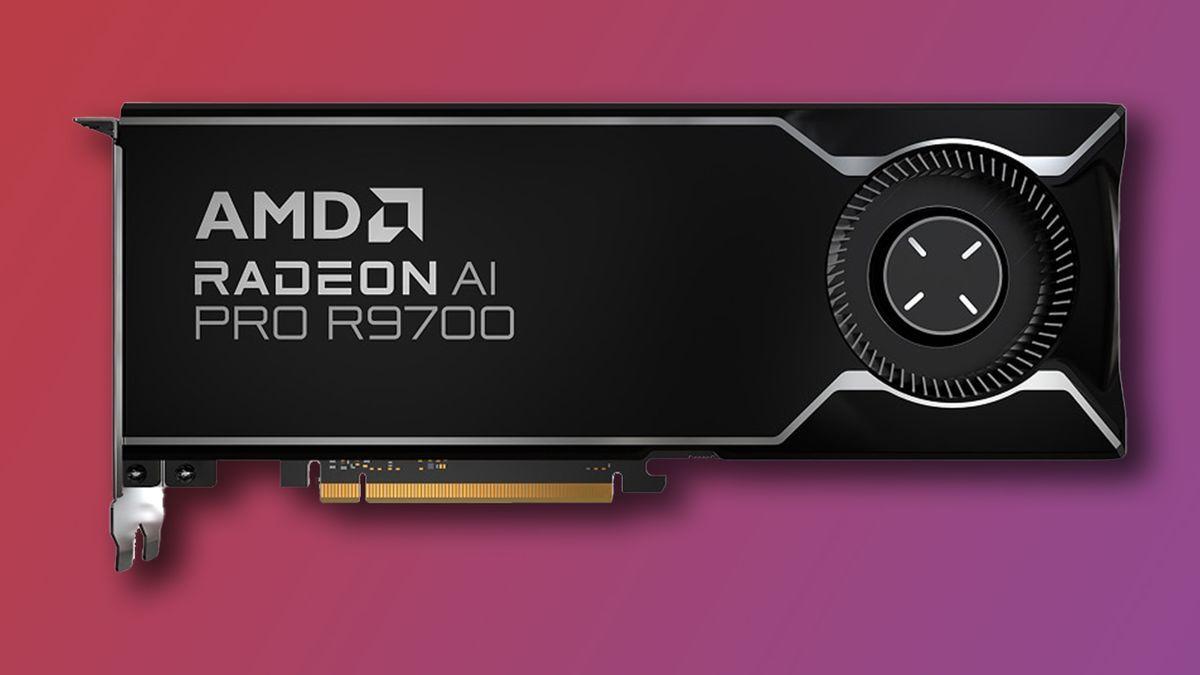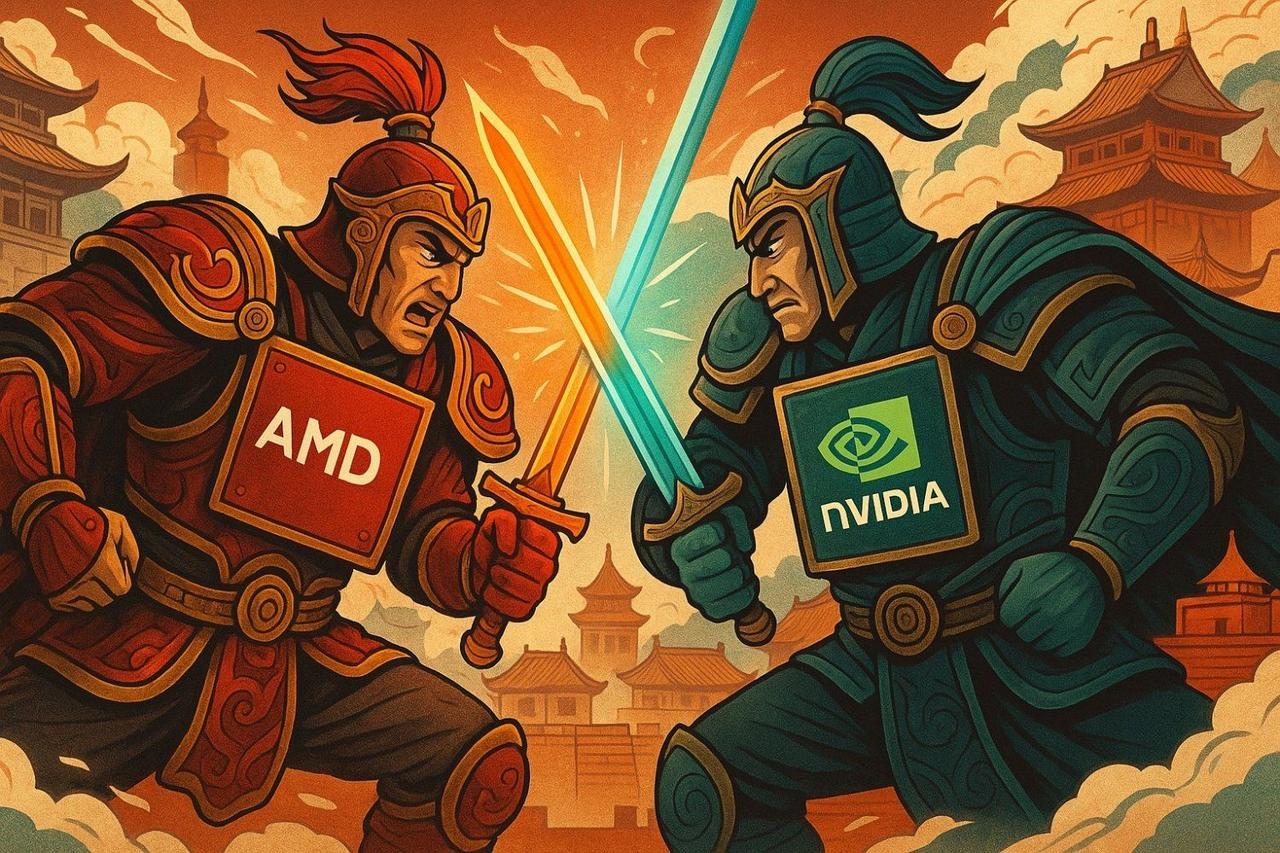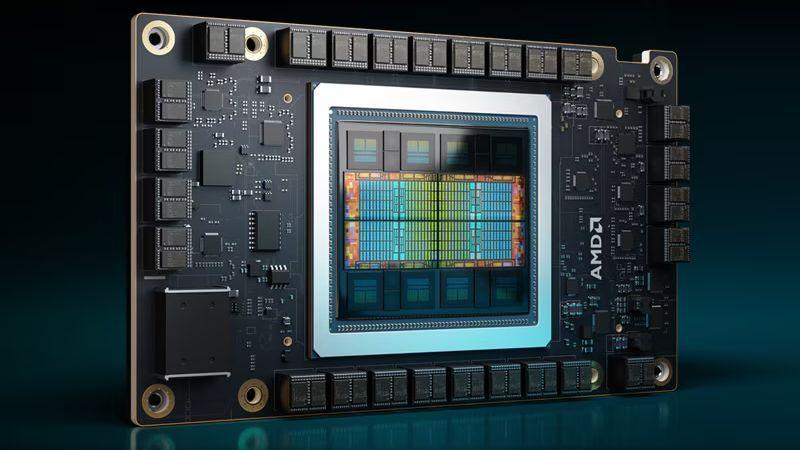NVIDIA and AMD Prepare New AI Chips for China Amid US Export Restrictions
5 Sources
5 Sources
[1]
NVIDIA, AMD may soon start selling new AI chips in China to comply with US restrictions | TechCrunch
To comply with the U.S.' restrictions on exporting advanced semiconductor technology to China, chipmakers NVIDIA and AMD will soon begin selling new GPUs made for AI workloads in China, Taiwanese tech publication Digitimes reported, citing supply chain sources. NVIDIA plans to sell a stripped-down AI GPU, code-named "B20," while AMD is looking to target AI workload needs with its new Radeon AI PRO R9700 workstation GPU, Digitimes reported, adding that the companies will likely start selling these AI chips in China from July. Earlier this week, Reuters reported that NVIDIA is working on a new budget AI chip built on its Blackwell architecture for China that is expected to be priced at $6,500-$8,000. In comparison, the company sells its H20 GPUs for $10,000-$12,000 each. NVIDIA on Wednesday said it had incurred a $4.5 billion charge in Q1 due to licensing requirements impacting its ability to sell its H20 AI chip to companies in China, and it couldn't ship an additional $2.5 billion of H20 chips in the quarter due to the restrictions. The company forecast that licensing requirements would result in an $8 billion hit to the company's revenue in Q2.
[2]
AMD to build export-compliant AI chips for the Chinese market, Radeon AI PRO 9700 to arrive by 3Q25
AMD is following Nvidia and introducing an AI chip that complies with Washington's limitations. AMD is following the lead of Nvidia in creating a new AI chip for the Chinese market that complies with Washington's export controls. The Radeon AI PRO R9700 is designed specifically for local AI inference and other AI workloads, and is also scalable for multi-GPU setups and is expected to arrive by the third quarter of 2025, according to DigiTimes. Meanwhile, Nvidia remains on track to release the Nvidia B20. Although it's based on the latest Blackwell architecture, its compute and memory dies have been downgraded to conform to the limitations the White House has placed on AI chip exports to China. These GPU manufacturers have taken massive write-offs due to the expanding chip restrictions. Nvidia CEO Jensen Huang said that his company took a $5.5-billion hit as it can no longer sell and deliver its H20 chip to its Chinese customers, while AMD is taking an $800 million haircut because the MI308 is too powerful for the White House's liking. Nevertheless, they cannot just abandon China, especially as the country is one of the biggest customers for AI chips. For instance, although these chips aren't the very best that Nvidia and AMD can offer, there's still strong interest in them among Chinese institutions. Sales of Nvidia's H20 still jumped by 50% every quarter, despite being a watered-down version of its HGX H20 AI GPUs. And even though the Nvidia B20 and the Radeon AI PRO R9700 will likely be less powerful than the H20 and MI308, there's still demand for these chips because many AI models are highly optimized for these systems. Although Chinese AI chip development has been continually moving forward, Nvidia and AMD GPUs still offer better software and compatibility with existing hardware, at least for now. "AI researchers are still doing AI research in China. They have a lot of mobile technology they would use if they didn't have Nvidia. If they don't have enough Nvidia, they will use their own! They'll use the second best," Huang said in a recent interview. "Then lastly, of course, the local companies are very, very talented and very determined, and the export controls gave them the spirit, the energy, and the government support to accelerate their development. And so, I think, all in all, the export control was a failure -- the facts would suggest it."
[3]
AMD preps China-specific AI chip to battle NVIDIA, Huawei: cut-down Radeon AI PRO R9700 rumored
AMD reportedly preparing 'China-specific' AI GPU option to battle NVIDIA and Huawei: we should expect to see a cut-down version of the Radeon AI PRO R9700. As an Amazon Associate, we earn from qualifying purchases. TweakTown may also earn commissions from other affiliate partners at no extra cost to you. AMD is expected to adjust their downgraded chip designs to form a new family of AI GPUs that will comply with the constantly evolving US export restrictions starting in July 2025, with a new rumored AI GPU that will battle NVIDIA and Huawei in China. In a post by insider @Jukanlosreve we're hearing that AMD will soon have an AI GPU answer for the Chinese market that complies with US export restrictions, with DigiTimes reporting that AMD is expected to offer an RDNA 4-based Radeon AI PRO R9700 workstation GPU for the Chinese market. AMD would be cutting down its specs to meet the US export restrictions, but will have just GDDR6 memory on its China-specific Radeon AI PRO R9700 GPU, versus NVIDIA with its rumored B20 shifting from HBM to GDDR memory, and GDDR7 at that (with far more memory bandwidth, which is an important part of AI workload performance). NVIDIA currently uses HBM3 or HBM3E depending on the AI GPU, with Hopper H100 and H200 on the market and Blackwell B100 and B200 either HBM3 or HBM3E. NVIDIA created a cut-down H20 for the Chinese market, with HBM3 and now rumor has it a new B20 AI GPU is being prepped, but will use GDDR7 memory -- like its RTX PRO 6000 Blackwell workstation GPU -- shifting away from HBM. AMD used previous-gen GDDR6 memory on its Radeon RX 9000 series "RDNA 4" gaming GPUs as well as its new Radeon AI PRO R9000 series workstation GPUs, while NVIDIA moved to next-gen GDDR7 memory on its new GeForce RTX 50 series gaming GPUs. Both companies are using HBM on their respective AI GPUs, with HBM3E used on various AI GPUs, but NVIDIA recently announced its RTX PRO 6000 Blackwell GPUs with up to 96GB of GDDR7 -- powerful workstation cards, using new GDDR7 memory. NVIDIA has continued to cut its Hopper AI GPUs down more and more to comply with US export rules, with HBM used on its China-specific H20 AI GPU that was recently banned in the end anyway. Rumor has it a new B20 AI GPU is being prepared and will NOT being HBM, instead GDDR7 memory to comply with US export rules... AMD seems to be following in on those foot steps.
[4]
After losing billions NVIDIA and AMD are trying a brand new China chip strategy
NVIDIA and AMD are expected to begin selling new GPUs in China starting in July, according to Digitimes, to comply with U.S. restrictions on advanced semiconductor technology exports. These GPUs are designed for AI workloads. NVIDIA's offering will be a modified AI GPU, codenamed "B20." AMD plans to introduce its Radeon AI PRO R9700 workstation GPU to address AI workload demands, according to Digitimes' supply chain sources. Reuters reported earlier this week that NVIDIA is developing a budget AI chip for China based on its Blackwell architecture, with an expected price range of $6,500 to $8,000. The company's H20 GPUs are currently priced between $10,000 and $12,000 each. NVIDIA disclosed a $4.5 billion charge in Q1 due to licensing requirements affecting H20 AI chip sales to Chinese companies. The company also reported an additional $2.5 billion in lost H20 chip shipments during the quarter due to the export restrictions. NVIDIA forecasts an $8 billion revenue impact in Q2 because of these licensing requirements.
[5]
AMD to Launch a "China-Specific" AI Chip Option To Rival NVIDIA & Huawei; Expected to Be a Cut-Down Version of the Radeon AI PRO R9700
AMD plans to focus on the China AI market with its "Radeon PRO" workstation GPUs, which comply with US regulations and offer an alternative to NVIDIA. AMD Plans To Enter China's AI Markets With a Workstation GPU Offering, Capitalizing On NVIDIA's Situation China's AI market is currently under immense uncertainty, amid growing concerns about US regulations and the emergence of domestic firms with capable alternatives. In particular, NVIDIA isn't certain about what to do when it comes to business with China at all, since in the recent earnings call, it was revealed that with consistent restrictions, Team Green might have to announce a business foreclosure. In light of this, AMD is prepping an AI chip for Chinese markets that will likely help the firm increase its influence over the region. DigiTimes reports that AMD expects to offer its RDNA4-based Radeon AI PRO R9700 workstation GPU to Chinese customers, under the impression that NVIDIA's upcoming "Blackwell" AI chip will also offer a GDDR7 solution to the market. This means that Team Green and AMD would be on par when it comes to the performance they are offering to the segment, given that both of these firms will introduce AI options that are similar in specifications, but NVIDIA would definitely hold the advantage with its robust software ecosystem. Team Red may be able to drive interest in its workstation-level GPU for China by offering better prices, availability, and even consistent supply, but relative to NVIDIA, AMD has far less influence over Chinese markets. However, it is safe to say that AI chip options from the West in China are now approaching a point where they are severely behind domestic alternatives, such as those from Huawei, making it difficult for the likes of AMD/NVIDIA to pitch them to Chinese tech giants. It won't be wrong to say that competing in China is going to be a much more difficult task moving ahead, since with US restrictions in place, selling capable options to the region won't be an option anymore. And, with the growing influence of domestic competition such as that of Huawei, NVIDIA/AMD are basically stuck in a difficult situation.
Share
Share
Copy Link
NVIDIA and AMD are developing new AI-focused GPUs for the Chinese market to comply with US export restrictions, aiming to maintain their presence in a crucial market while balancing regulatory challenges.
NVIDIA and AMD's New AI Chip Strategy for China
In response to stringent US export restrictions on advanced semiconductor technology, chip giants NVIDIA and AMD are gearing up to introduce new AI-focused GPUs tailored for the Chinese market. This strategic move comes as both companies seek to maintain their foothold in one of the world's largest AI chip markets while navigating complex geopolitical challenges
1
2
.The New Offerings
NVIDIA is reportedly developing a budget AI chip codenamed "B20," based on its cutting-edge Blackwell architecture. This GPU is expected to be priced between $6,500 and $8,000, significantly lower than the company's current H20 GPUs, which sell for $10,000-$12,000 each
1
4
.AMD, not to be left behind, is preparing to launch the Radeon AI PRO R9700 workstation GPU. This chip is specifically designed for local AI inference and other AI workloads, with the capability to scale for multi-GPU setups
2
3
.
Source: Tom's Hardware
Compliance with US Restrictions
Both companies are modifying their designs to ensure compliance with US export controls. NVIDIA's B20 chip will feature downgraded compute and memory dies, while AMD's offering is expected to use GDDR6 memory instead of more advanced options
2
5
.These new chips, while less powerful than their unrestricted counterparts, are still anticipated to generate significant interest among Chinese institutions due to their optimization for existing AI models and compatibility with current hardware
2
.Financial Impact and Market Dynamics
The export restrictions have already taken a substantial toll on both companies. NVIDIA reported a $4.5 billion charge in Q1 2025 due to licensing requirements affecting H20 AI chip sales to Chinese companies. The company forecasts an additional $8 billion revenue impact in Q2
1
4
.AMD, while less affected, still faces an $800 million write-off due to restrictions on its MI308 chip
2
.Related Stories
Competitive Landscape in China

Source: TweakTown
The introduction of these new chips comes at a critical time in the Chinese AI market. Domestic companies, such as Huawei, are rapidly developing their own AI chip alternatives, spurred on by the export controls
2
5
.NVIDIA CEO Jensen Huang acknowledged this shift, stating, "AI researchers are still doing AI research in China. They have a lot of mobile technology they would use if they didn't have Nvidia. If they don't have enough Nvidia, they will use their own!"
2
Future Outlook
Despite the challenges, both NVIDIA and AMD remain committed to the Chinese market. The companies are expected to begin selling these new GPUs in China starting from July 2025
1
4
.
Source: Wccftech
However, the long-term effectiveness of this strategy remains uncertain. As NVIDIA's Huang noted, "I think, all in all, the export control was a failure -- the facts would suggest it." This sentiment underscores the complex interplay between technological innovation, market forces, and geopolitical considerations in the global AI chip industry
2
.References
Summarized by
Navi
[1]
[2]
[3]
Related Stories
Recent Highlights
1
Pentagon threatens Anthropic with Defense Production Act over AI military use restrictions
Policy and Regulation

2
Google Gemini 3.1 Pro doubles reasoning score, beats rivals in key AI benchmarks
Technology

3
Anthropic accuses Chinese AI labs of stealing Claude through 24,000 fake accounts
Policy and Regulation








